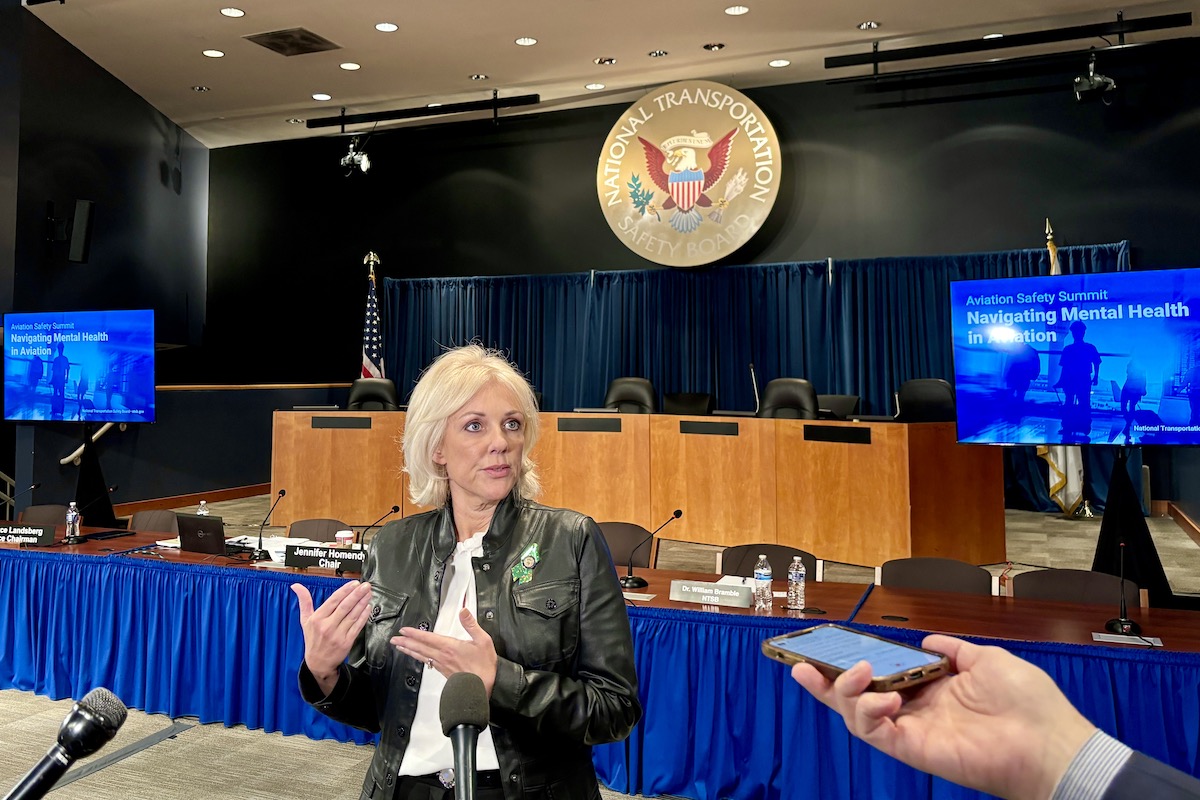Skift Take
Unraveling the "bureaucratic nightmare" that is the FAA's mental health processes will be tough. But NTSB Chair Jennifer Homendy is firm that it needs to be done.
Just two years ago, the head of the Federal Aviation Administration, Steve Dickson, encouraged pilots to seek mental health treatment if needed, but also referred to the risk to their careers of doing so as “perceived.”
But at a summit about mental health Wednesday, it was clear that the risk to any aviation professional’s career is very real.
“There’s a culture right now, which is not surprising to me, that you either lie or you seek help,” said Jennifer Homendy, chair of the National Transportation Safety Board, which held the event in Washington, D.C. “We can’t have that. That’s not safety.”
The issue received new attention in October after an Alaska Airlines pilot Joseph Emerson nearly brought down a plane in while suffering a mental health crisis. Emerson said that he had experienced depression-like symptoms since the death of a friend in 2018 — some five years before the incident.
Emerson is not alone. More than 55% of pilots have expressed reluctance to report mental health issues due to fear of career reprisals, according to researcher William Hoffman, an affiliated assistant professor of aviation at the University of North Dakota.
Long Waits, Little Financial Support
Stephanie Day, a Horizon Air flight attendant and aspiring pilot, said Wednesday that by her best estimate, it will have taken at least eight years for the FAA to let her fly as a solo pilot after she first disclosed seeking mental health treatment in 2016.
She plans to reapply before the end of the year and expects the FAA to take around 12 months to make a decision.
She asked, Has it been worth it? “This is my journey, and it is worth it to me.”
She was joined at the summit by other aviation professionals, including pilots, instructors, and the parents of John Hauser, who took his own life when dealing with depression as a student pilot.
The consensus was that the costs of both being out of work and receiving treatment all push individuals towards either not reporting mental health issues or self-medicating. The FAA’s required psychiatric evaluations to return to work can cost thousands of dollars and are not covered by insurance.
“We got the message loud and clear from all sides: If you want to fly, you can’t admit anything is wrong, at all,” said Laila Stein, a certified flight instructor at Jeff Air Pilot Services in Indiana and a recent graduate from Western Michigan University.
FAA Faces ‘Wave’ of Medical Requests
When a pilot or other aviation professional wants to return to work after receiving mental health treatment, they must secure sign off from the FAA in terms of a medical certificate. Applications for those certificates have surged in recent years.
“The wave hit us,” said Penny Giovanetti, director of the medical specialties division at the FAA, of the requests for medical certificates from pilots receiving mental health treatment. That wave has come in just the past few years as the agency has faced numerous challenges from the pandemic, a leadership change, and staffing issues.
Giovanetti emphasized that the FAA is aware of and addressing the issues. She is “optimistic” that processing times will improve — just not soon due to a “horrendous” backlog.
“It is a very cumbersome federal bureaucratic nightmare,” is how Homendy described the process.
FAA Administrator Michael Whitaker on Tuesday formed a new rulemaking committee to review the agency’s pilot mental health rules and processes. The aim is to make recommendations “that break down the barriers that prevent pilots from reporting and seeking care for mental health issues.”
The committee will have around 20 voting members, all of whom will come from outside the FAA, Giovanetti said. She did not disclose the timeline for naming those committee members.
Aviation Professionals Need More Support on Mental Health
Many want to see the FAA do more than simply speeding up the time it takes to re-certify pilots and others after they experience mental health issues. Panelists called for more peer support on the issue, which many keep private, as well as expanding the list of approved medications that pilots can take.
Homendy called for some form of an amnesty period from the FAA where aviation professionals who have experienced issues can come discuss their situation openly without fear of repercussions.
“We are all human,” Homendy said. “Who hasn’t among us faced some sort of crisis in our lives? We expect pilots will be some super heroes and continue on as if nothing’s happened in our lives … Everyone is in need of help at some point.”
The Daily Newsletter
Our daily coverage of the global travel industry. Written by editors and analysts from across Skift’s brands.
Have a confidential tip for Skift? Get in touch
Tags: airlines, faa, ntsb, pilots
Photo credit: NTSB Chair Jennifer Homendy at the aviation mental health summit. Edward Russell / Skift
